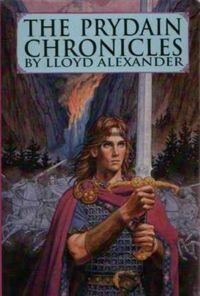The Chronicles Of Prydain
 To me, the Chronicles of Prydain were a revelation. Until then, I had never been enthusiastic about reading, seeing it more as a chore than as a pleasure. Only a few authors were capable of capturing my hyperactive imagination and in between I was stuck with the generic Adventures of a Girl and Her Pony, and there are only so many of those I can take.1 It wasn’t until my dad came home from a library sale with that battered copy of The Book Of Three that I discovered not only a true passion for reading, but for all things fantasy.
To me, the Chronicles of Prydain were a revelation. Until then, I had never been enthusiastic about reading, seeing it more as a chore than as a pleasure. Only a few authors were capable of capturing my hyperactive imagination and in between I was stuck with the generic Adventures of a Girl and Her Pony, and there are only so many of those I can take.1 It wasn’t until my dad came home from a library sale with that battered copy of The Book Of Three that I discovered not only a true passion for reading, but for all things fantasy.
I recently revisited the Chronicles. It was a risky endeavor, since perhaps my fondness for the Chronicles was tinted with the rose-coloured glasses of nostalgia. I am loath to revisit some of my childhood’s favourites, for fear that they couldn’t hold up to my more experienced, adult standards.2 I am pleased to say that the Chronicles have stood the test of time. After only a few pages I was already filled with the same sense of wonder and excitement that I first felt more than 20 years ago. It has taken a place of pride on my bookshelves and I cannot wait until my nieces and nephews are old enough that I can share this experience with them.
The five volumes of Lloyd Alexander’s The Chronicles of Prydain were published between 1964 and 1968, followed by an anthology of short stories in 1970. Central to the Chronicles is a young boy named Taran, an orphan who has grown up on the farmstead of Dalben, an enchanter. Taran has aspirations of becoming a hero, but has to settle for the title Assistant Pig Keeper instead. When Arawn Deathlord once again makes a bid for power over Prydain, Taran is swept up in the events and during many adventures that take him to all the corners of the land, Taran learns what it truly means to be a hero.
The progression of Taran from boy to man gets as much, if not more, attention as the battle against the evil lord Arawn. In fact, my favourite volume, Taran Wanderer (book 4) is entirely devoted to Taran’s coming of age, and without it, some of his choices in the final volume would have seemed sudden and out of place. These elements are incorporated into the narrative so strongly and seamlessly that they resonated with me even at my early age.
Each of the characters is colourful and fleshed out. Gwydion, the crown prince of Prydain, is the hero Taran aspires to be and becomes a mentor and friend to the young boy. Princess Eilonwy is a feisty chatterbox; never content to stay behind, she prefers to get involved in the thick of the action. Gurgi, a half-feral humanoid, provides copious entertainment and proves to be as loyal a companion as Samwise Gamgee. Flewddur Flamm is a wandering bard (and sometimes king), owner of a magic harp whose strings break whenever he is caught telling a lie. And lastly there’s Doli, a dour and cantankerous dwarf with a heart of gold whose ability to turn invisible proves invaluable at times. Together, through their actions and conversations, they imbue the Chronicles with humour and the warmth of a well-tended hearth. To tell you the truth, I preferred this merry band to the rather solemn and humourless companions in Tolkein’s Fellowship (Not to mention that Taran makes for a more interesting hero than Frodo. At least Taran grew up and embraced adulthood, while Frodo is and always will be bitch to a piece of jewelry).
 Alexander excels at painting a fictitious realm that draws readers in, where many authors struggle.3 What ties the story, characters, and setting together is the masterful prose. During World War II, Alexander was stationed in Wales in a counter-intelligence outfit and the country and its myths have become a lasting influence on his work. No doubt inspired by his love for Wales, Alexander imbues its fantasy counterpart with heart and character. There is not a superfluous word or phrase in his narrative, and he writes such eloquent, almost poetic dialogue that I am often tempted to read it out loud.
Alexander excels at painting a fictitious realm that draws readers in, where many authors struggle.3 What ties the story, characters, and setting together is the masterful prose. During World War II, Alexander was stationed in Wales in a counter-intelligence outfit and the country and its myths have become a lasting influence on his work. No doubt inspired by his love for Wales, Alexander imbues its fantasy counterpart with heart and character. There is not a superfluous word or phrase in his narrative, and he writes such eloquent, almost poetic dialogue that I am often tempted to read it out loud.
The Chronicles of Prydain deserves a place on every child’s bookshelves. Like the Chronicles of Narnia and the Harry Potter series, they are among the true classics of the children’s fantasy genre and I am forever grateful for Lloyd Alexander’s legacy.
Edits by Matt Schneider
- Girls, in my experience, can be roughly divided in two kinds: those like me, who recognize ponies and horses as magnificent animals, but still prefer them from a distance, and those that greet even the slightest mention or glimpse of one with the amount of squealing normally associated with The Beatles, Johnny Depp, or Twilight. ↩
- A couple of years ago I rewatched The Goonies for the first time in perhaps 15 years. What I once proclaimed with youthful exuberance as the GREATEST MOVIE EVAH!! turned out to be no more than passably diverting, sometimes muddled, and, above all, LOUD children’s entertainment. ↩
- As anyone can attest to who has ever had the misfortune of struggling through one of Terry Brooks’ turgid output. ↩


Leave your response!